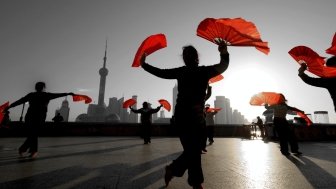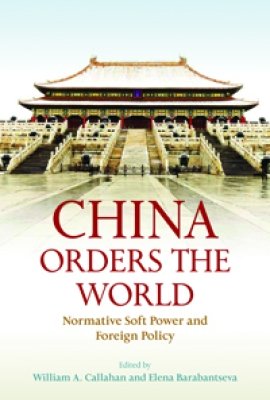William A Callahan
Former Fellow
Professional Affiliation
Professor of International Relations at the London School of Economics
Expert Bio
For the past two decades I have been exploring the interface between theory and practice in international politics: in particular how studies of Chinese foreign policy need to be better theorised, on the one hand, and how East Asian thought can add to political and international relations theory, on the other. In a way, this academic two-step started by chance when I moved to Thailand just as political demonstrations started brewing in April 1992. They eventually led to a mass movement, a massacre, and finally to a more democratic government. As a newly-minted political science PhD, I was fascinated by the social dynamics of these mass demonstrations; they made me question the standard theoretical explanations for democratic politics. While attending the daily demos, I got to know political party and NGO leaders; with this hands-on experience I published a series of op-eds in Thai newspapers, and eventually landed a job writing theoretically-informed opinion pieces and unsigned editorials for Bangkok's progressive daily, The Nation. My first book, Imagining Democracy (1998), is the result of this curious interplay between the excitement of writing to tight deadlines for an audience of millions, and the solitary scholarship that probed the ambiguous relation between culture and power. After I returned to academic life as a Lecturer at Rangsit University, I also refocused on my first love, Chinese culture and politics. My education and research have both aimed to be multidisciplinary in the sense of recognizing the need to grasp the depth of Chinese history and thought, as well as the need to engage in current international relations theory debates. Actually, long before Imagining Democracy came out, I published articles that explored the identity politics of Chinese philosophy and film. In the 1990s journalists and scholars often spoke about 'Greater China' to describe the contradiction between the burgeoning economic ties that were knitting together China, Taiwan and Hong Kong, and the political conflicts that were pulling them apart. Rather than treating Greater China as the sum of three geographical territories that had clear borders, I thought it would be interesting to see how 'Greater China' is a site where the conceptual borders between East and West, nation and state, self and Other are continually drawn, erased and reasserted. Since Greater China does not exist as a legal or an institutional body, I explored how it takes shape as a fantasy, both a dream and a nightmare, which is created through symbolic exchange between China and America and within East Asia. The resulting book, Contingent States: Greater China and Transnational Relations (2004), examines how Greater China is produced through social networks along its borders where foreign and domestic politics overlap and inform each other. In addition to explaining 'China', I think that it is also important to see how the thriving East Asian economy is producing new concepts and new ways of ordering international politics - which I also explore in Cultural Governance and Resistance in Pacific Asia (2006). While traditional explanations of Chinese politics tend to be Sinocentric, the aim of these two books is to shift the focus from the center to the periphery both spatially and conceptually. In a way, Contingent States grew out of my own experience of living and working at centers and peripheries on three continents; while I was writing Contingent States I moved to Britain to take up a job at Durham University. After spending nine years enjoying the beauties of rural northeastern England, I moved to the University of Manchester to savor the gritty energy of northern city life. My current research project, "Security, Identity and the Rise of China," builds on Contingent States's analysis of East Asian IR to see how the rise of China will impact East Asia, the United States and China itself. While Contingent States is directed at an academic audience, for my project at the Woodrow Wilson Center I am interested in engaging with a broader professional readership. This fits with my interest in interacting with policy-makers: as a graduate student I was a degree fellow at the East-West Center (Honolulu), and over the past decade I have worked with think tanks in Britain, Europe and China. As Co-Director of the British Inter-university China Centre - the largest center for Chinese studies in Europe - I organize collaborative events for Britain's Foreign Office. I look forward to working with the academic and policy-making communities in Washington.
Education
B.A. (1986) McGill University; M.A. (1988) University of Hawaii; Ph.D. (1992) University of Hawaii
Subjects
China,East Asia,International Security,Thailand
Experience
- Chair Professor of International Politics, University of Manchester, 2005-present
- Research Director, Centre for Chinese Studies, University of Manchester, 2005-present
- Senior Lecturer (Assoc. Prof.) of International Politics, University of Durham, UK, 2000-05 (Lecturer (Asst. Prof.), 1996-2000)
- Director, Centre for Contemporary China Studies, University of Durham, 2003-05 (Deputy Director, 2000-03)
- Director and Lecturer, Philosophy, Politics and Economics Programme, Rangsit University, Bangkok, Thailand, 1993-96
- Journalist, The Nation, Bangkok, 1992-93
- Visiting professorships/fellowships: Harvard University, Renmin University of China, University of Oregon, University of Hong Kong, Seoul National University, University of Hawai'I, Chulalongkorn University
Expertise
Chinese foreign policy; identity and security in East Asia; US-China and EU-China relations; China's soft power; Thai politics
Wilson Center Project
"Security, Identity and the Rise of China"
Project Summary
Most analyses of the rise of China look to its hard power assets of growing economic and military strength. My study will examine how China's growing power needs to be understood in terms of its identity politics to see how the PRC's national security is closely tied to its nationalist insecurities. I will analyze Chinese-language sources to argue that alongside the PRC's positive reformist foreign policy that engages the world, Chinese media and education are promoting a nationalism that is suspicious of the world. The project will chart how nationalism and foreign policy inform each other in China according to three themes - history, territory and ethnicity - and consider how China's identity/security nexus guides its policy toward the U.S. East Asia and Europe.
Major Publications
- Contingent States: Greater China and Transnational Relations, University of Minnesota Press, 2004.
- Cultural Governance and Resistance in Pacific Asia, London: Routledge, 2006.
- "How to Understand China: the Dangers and Opportunities of Being a Great Power," Review of International Studies 31:4 (2005), pp. 701-14.
Insight & Analysis by William A Callahan
Filter
- Past event
China Dreams: 20 Visions of the Future

- Book
- Global Governance
China Orders the World: Normative Soft Power and Foreign Policy


